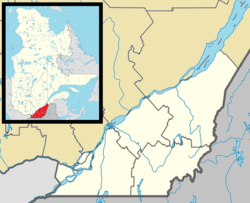Ste. Anne de Bellevue, Quebec
| Sainte-Anne-de-Bellevue | |
|---|---|
| City | |

Town hall
|
|
| Motto: Omnia per laborem et fidem (All through work and faith) |
|
 Location on the Island of Montreal. (Outlined areas indicate demerged municipalities). |
|
| Location in southern Quebec. | |
| Coordinates: 45°24′14″N 73°57′09″W / 45.40389°N 73.95250°WCoordinates: 45°24′14″N 73°57′09″W / 45.40389°N 73.95250°W | |
| Country |
|
| Province |
|
| Region | Montreal |
| RCM | None |
| Founded | 1703 |
| Constituted | January 1, 2006 |
| Government | |
| • Mayor | Paola Hawa |
| • Federal riding | Lac-Saint-Louis |
| • Prov. riding | Jacques-Cartier |
| Area | |
| • Total | 11.20 km2 (4.32 sq mi) |
| • Land | 10.57 km2 (4.08 sq mi) |
| Population (2011) | |
| • Total | 5,073 |
| • Density | 480.0/km2 (1,243/sq mi) |
| • Pop 2006-2011 |
|
| • Dwellings | 2,202 |
| Time zone | EST (UTC−5) |
| • Summer (DST) | EDT (UTC−4) |
| Postal code(s) | H9X |
| Area code(s) | 514 and 438 |
| Highways |
|
| Website | www anne-de-bellevue |
Sainte-Anne-de-Bellevue (French pronunciation: [sɛ̃t an də bɛlvy]) is an on-island suburb located at the western tip of the Island of Montreal in southwestern Quebec, Canada. It is the second oldest community in Montreal's West Island, having been founded as a parish in 1703. The oldest, Dorval, was founded in 1667.
Points of interest include the Sainte-Anne-de-Bellevue Canal (a National Historic Site of Canada), the Sainte-Anne Veterans' Hospital, the Morgan Arboretum, and the L'Anse-à-l'Orme Nature Park. Sainte-Anne-de-Bellevue is also home to John Abbott College and McGill University's Macdonald Campus, which includes the J. S. Marshall Radar Observatory and the Canadian Aviation Heritage Centre as well as about 2 square kilometres (0.77 sq mi) of farmland which separates the small town from neighbouring Baie-d'Urfé.
Sainte-Anne-de-Bellevue was established on a location once known and frequented by both the Algonquin and Iroquois peoples. Situated between two important lakes (Lac des Deux-Montagnes and Lac Saint Louis) and near the confluence of two important rivers (the Saint Lawrence River and the Ottawa River) both nations recognized its natural strategic advantages and had names for the place. The oral records show that it was named “Tiotenactokte” by the Algonquin, which means "place of the last encampments" and that the Iroquois called it “Skanawetsy” meaning "white waters, after the rapids".
...
Wikipedia

